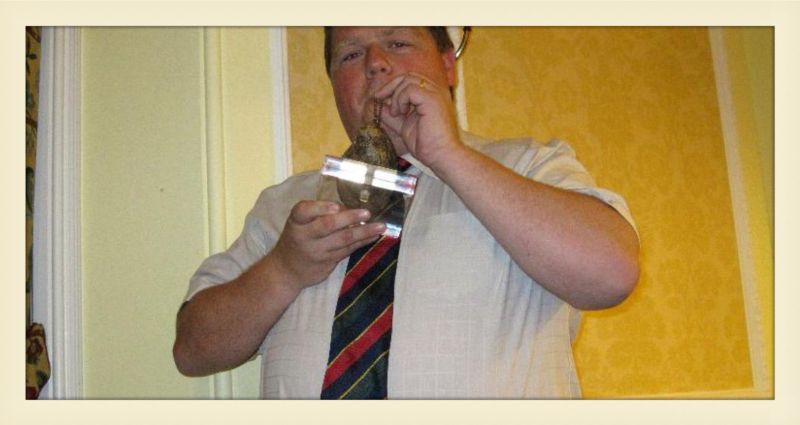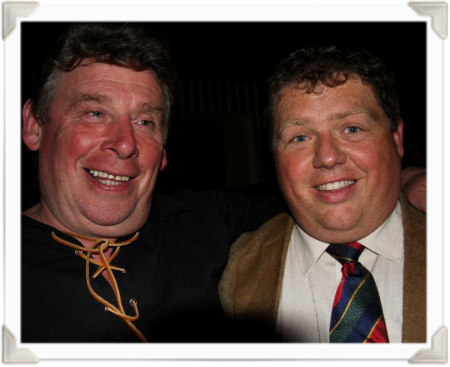 A competition was once more held at Friars Carse, erstwhile home of the Poet Burns’ friend and Patron Robert Riddel of Glenriddel and the scene of a very different competition which inspired Burns’ song. Our speaking competition, judged by Wilson Ogilvie Past President of the Robert Burns World Federation, Mike Duguid, Immediate Past President of the same august body and Sophia Harkness, well respected local educator and Burnsian, was won by Cameron Goodall, who is also the present holder of the World John Lapraik speaking competition, and a past winner of the Dumfries Ladies Burns Club No.1’s prestigious Tam o’ Shanter competition.
A competition was once more held at Friars Carse, erstwhile home of the Poet Burns’ friend and Patron Robert Riddel of Glenriddel and the scene of a very different competition which inspired Burns’ song. Our speaking competition, judged by Wilson Ogilvie Past President of the Robert Burns World Federation, Mike Duguid, Immediate Past President of the same august body and Sophia Harkness, well respected local educator and Burnsian, was won by Cameron Goodall, who is also the present holder of the World John Lapraik speaking competition, and a past winner of the Dumfries Ladies Burns Club No.1’s prestigious Tam o’ Shanter competition.

The Whistle is a work in ballad form commemorating a drinking contest between Alexander Fergusson of Craigdarroch, Robert Riddel of Glenriddel and Sir Robert Laurie, 5th Baronet of Maxwelton (Annie Laurie of the song was a sister of his grandfather). The Whistle itself had purportedly been brought to these shores by a gigantic Danish retainer in the train of Anne of Denmark, wife to King James VI. Legend has it that this ‘Great Dane’ had been victor at drinking contests in many of the great courts of Europe, at Moscow, Warsaw, Hanover and Paris. At the commencement of these competitions, a small ebony whistle was placed on the table and the man last able to produce a note from the whistle was declared winner.
At last – so the legend states – the whistle was rested from the Dane’s hands by an earlier Sir Robert Laurie, 1st Bt of Maxwelton (and Annie Laurie’s father). Sadly, the dates don’t add up. Sir Robert must have been born c.1650, whilst Anne of Denmark arrived in Scotland on 1st May 1590. Even at great extremity these two characters were unlikely to have met, and certainly not in fair contest. Had the unknown Dane been only 20 in 1590 he would have been around 100 years of age by the time Sir Robert reached the same milestone.
Unfortunately the whistle itself was not present at this year’s competition and instead a replica was played for. Nonetheless this allowed the victor to carry the spoils of the field with him at the close of the day, something William Cuninghame, present day curator of the Whistle, could never have allowed. It can be viewed at Caprington Castle, Kilmarnock.
This year’s victor, Cameron ‘Cammy’ Goodall of Lasswade, had been bested in last year’s contest by his great friend Will Horne of Prestonpans. Cammy said, “I had attempted to sing at last years contest, the work having been originally envisaged as a song, but more to introduce a little contrast than with any view of winning. After the contest I was upbraided by Kirsten [Easdale] for not sticking rigidly to Burns original text. Although it rankled a little at the time, I knew she was right. When I set out to learn a song, I don’t slavishly follow the text of the author – folk music doesn’t grow if it’s too much an academic pursuit and I hadn’t reviewed the text for a long time prior to the competition. When I got back home, I realised just how grievously I had strayed from the text.” Kirsten was peculiarly well qualified to point out these errors, having previously recorded the song for Dr Fred Freeman’s groundbreaking Linn recording of the Complete Songs of Robert Burns.
Not abashed, though, he resolved to try again, but this time to recite along with the rest of the competitors: “I realised as I read through the text anew that it was curiously bereft of Scotticisms, and as I delved further I realised this was intentional. Although Burns’ songs tend to use the dialect more sparingly than his poems, this work has not one instance of Lallans. The ballad is hugely influenced by James McPherson’s Ossian, epic poetry supposedly translated from ancient Gaelic texts. Perhaps you’ll be aware that Gaelic speakers tend to speak very correct English, the two traditions of Gaelic and Lallans belonging to entirely different indigenous races, who for most of Scotland’s history have faced each other on the battlefield. McPherson could be mistaken as having written in English for purely pecuniary reasons, particularly since Ossian turned out to be a hoax, but if a Celt must speak in English, it will be the very correct English of the classroom, not the vernacular of the playground. So the penning of this ballad in very August English is not a sop to his wealthy sponsors, but a nod to the contemporaneous Antiquary response to an older civilisation.”
The night, hosted by the Thornhill and District Burns Club was a tremendous success. Chairman Ronnie Cairns was delighted that the evening had proven popular once again, thanks greatly to the efforts of Secretary Doreen Moran.

No comments yet.